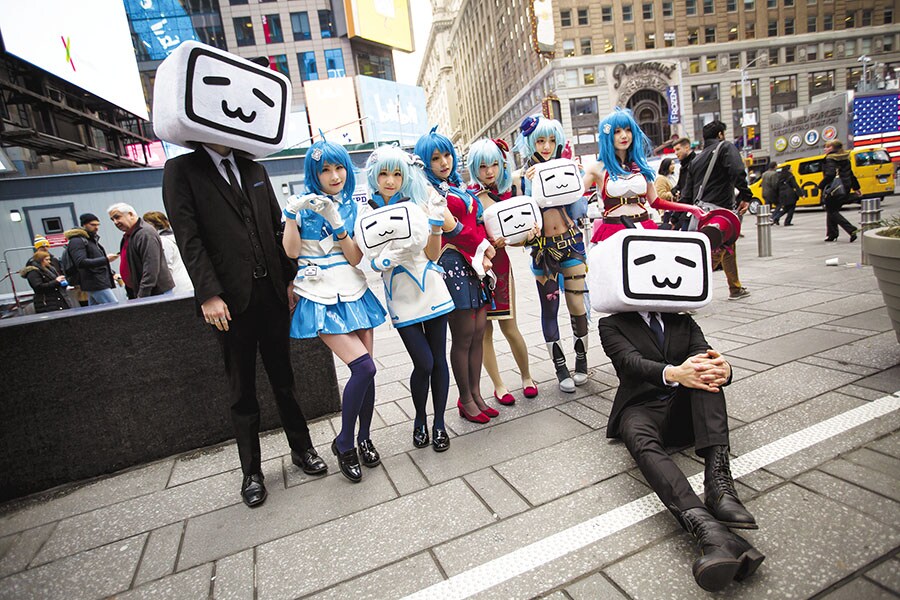
Bilibili: Show me the money
Chinese millennials are flocking to the anime and gaming site. But can it make a profit?
 Attendees wearing anime costumes celebrate at the Nasdaq during Bilibili’s IPO in March
Attendees wearing anime costumes celebrate at the Nasdaq during Bilibili’s IPO in March
Image: Michael Nagle / Bloomberg
Anime and video games have long been an obsession for Li An, but the 30-year-old IT worker from China’s southern city of Shenzhen can spare only about an hour a day to indulge his interest. When he goes online to watch videos of his latest fascination, a sci-fi game about androids taking over the world, there are several platforms competing for his attention, but he’s loyal to just one site. “I discovered Bilibili when I was in college,” says Li. “It’s still one of my favourite pastimes today.”
Li is one of more than 77 million Chinese fans watching the animation and gaming videos hosted by Bilibili every month. The Nasdaq-listed company sees that user base, which is both internet-savvy and loyal, as its biggest advantage. Chen Rui, Bilibili’s chief executive, told local media recently that its strategy is to offer more online services, such as gaming and paid memberships, so it can boost revenue and start turning a profit. The company’s revenues more than doubled to $138 million in the first quarter this year, with losses shrinking to $9.2 million.
Under the leadership of 40-year-old Rui, a confessed anime fan as well as a serial entrepreneur, Bilibili has carved out a formidable niche while going up against internet giants like Alibaba and Tencent, which have been spending billions in a cut-throat race to dominate the country’s massive online video market. Analysts say Bilibili has some unique advantages, but it remains to be seen whether the company can turn a profit while keeping all those Chinese millennials engaged.
Bilibili has several unusual features that distinguish it from rival sites. In addition to providing content through exclusive partnerships with local artists and overseas studios, the platform has created a number of ways to immerse its users in the so-called “er ci yuan” culture. The term, which loosely translates as “two-dimensional space”, is widely used in China to refer to the virtual world of anime, comics and games.
 CEO Chen Rui, serial entrepreneur and confessed anime fan
CEO Chen Rui, serial entrepreneur and confessed anime fan Image: Michael Nagle / Bloomberg
“Bilibili is like a community of young fans,” says Tong Chen, managing director of investment firm IDG Capital, which has invested in the company. “In China there isn’t any similar platform of this scale, and it is keeping users highly engaged.”
One such feature allows users with site membership to gain access to more content by passing online tests with questions involving subjects that range from company history to Japanese manga artists. Members also have access to more interactive functions like “bullet-screen chatting”, which allows multiple viewers to type in comments that are shown simultaneously across a streaming video, like darting bullets.
Bilibili’s users spent an average of 78 minutes a day on the platform in April, up from 73 minutes in March, according to consultancy Analysys International. As Tong says, Bilibili’s user base is distinctively young: More than 55 percent of its viewers are under 24, compared with 18 percent to 19 percent at Alibaba’s Youku Tudou, Tencent Video and the Baidu-backed iQiyi, Analysys International’s data shows. The rest of Bilibili’s fans are mostly longtime followers like Li, who started to visit the site during his first year of university and helped spread its popularity through word of mouth.
Chen, who was a founding member of New York-listed mobile apps maker Cheetah Mobile before joining Bilibili in 2014, has an official page on the site that uses a Japanese cartoon as his profile picture. He regularly engages with users by commenting on trending clips and is a fan of popular anime series including Fate/Apocrypha and Re:Creators.
More important than Chen’s online interactions has been the talent Bilibili has recruited. The company was founded in 2009 by Xu Yi, 28, who built the prototype site. He later gave control to Chen but stayed on as president to take charge of its “community culture”, according to its prospectus (which also states that Chen Rui has a 21.5 percent ownership stake and Xu Yi 13.1 percent. Chen has since upgraded the company’s technology, expanded its team to 2,000 and introduced more services such as anime-themed games and pay-per-view shows. “It is rare to find someone of Chen’s age who understands Bilibili’s youth culture and also has the right expertise to manage the firm,” IDG’s Tong says.
Still, Bilibili is nowhere close to achieving Chen’s grand ambition.
The company says in its prospectus that it has evolved into a “full-spectrum online entertainment world” covering video, live broadcasts and mobile games, but it has yet to figure out how to make money beyond gaming.
Bilibili depends on mobile games—chiefly the Fate/Grand Order and Azur Lane, both licenced from Japan—for as much as 80 percent of its revenue. The imbalance is a risk because it shows the company’s “main operation of video streaming isn’t becoming a revenue driver”, says Ma Shicong, an Analysys International analyst. And this seems unlikely to change in the near future. In China, people are just starting to open their wallets for content, after years of rampant piracy that severely hindered subscription-based memberships. For Bilibili, this means that related payments are unlikely to contribute much to revenue anytime soon, says Guo Chengjie, an analyst at Beijing-based consultancy iResearch.
Meanwhile, the company’s experience selling advertising—a major revenue source at other Chinese video services—sparked an online backlash. In 2016 Bilibili placed ads in several Japanese anime series, which angry users pointed out was in violation of the founder’s promise of “forever no ads” in the videos on its site. Chen quickly made a public apology, and now the site carries only banner ads. In the meantime, competition has been heating up. In a bid to attract young users, iQiyi, Youku Tudou and Tencent Video are all beefing up their anime channels, with the Tencent-backed video-sharing site Kuaishou recently acquiring Bilibili rival AcFun for an undisclosed amount.
IDG’s Tong remains optimistic. “Monetisation is at the very early stages,” he says. “If not done right, this will affect user experience. But as long as the company can keep people engaged and spend longer periods of time inside its platform, monetisation is sure to happen someday.”
(This story appears in the 30 November, -0001 issue of Forbes India. To visit our Archives, click here.)




